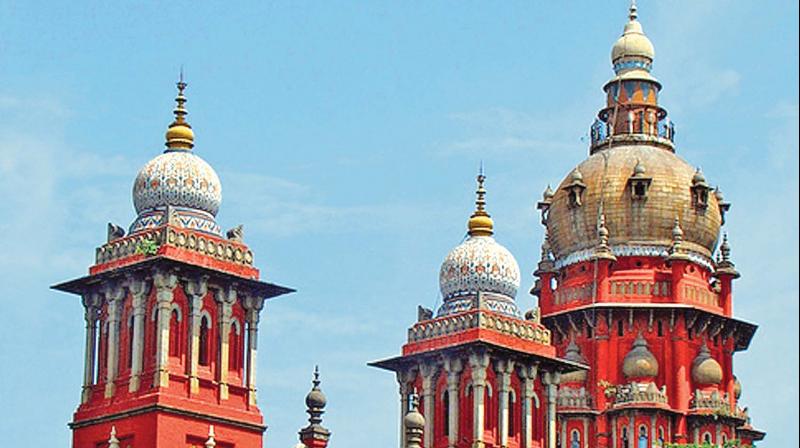Madras high court slams officials for inaction against illegal digital banners

Chennai: Slamming the authorities concerned for not taking action against erection of unauthorised digital banners, the Madras high court has directed the Commissioner, Kancheepuram Municipality, the Superintendent of Police, Kancheepuram District and the Collector, Kancheepuram district to personally remain present before the court on March 13 and explain as to the action taken to abate the nuisance and also identify the officials/persons, who are responsible for the said violations in the form of affidavits.
A division bench comprising Justices M. Sathyanaraynan and M. Nirmal Kumar said, “This court, in the order dated December 20, 2018, which is the subject matter of this contempt petition, has also pointed out that despite subsistence of Rules and various orders passed by this court for very many years, neither the Rules nor the orders passed by this court have been adhered to/complied with and left with no other option only, has passed the above said order. The authorities concerned have not learnt their lesson and it may be that they would like to learn their lesson in a hard way”.
The bench gave the directive on the contempt petition and applications filed by social activist Traffic Ramaswamy.
The bench said this court had taken note of the affidavit filed by the Principal Secretary to Government and passed an order dated February 13, 2019, wherein it was observed that “the present affidavit is hardly satisfactory and except the affidavit containing five pages, no worthwhile details as to the prosecution for the violation that already took place and the prevention mechanism so as to prevent such kind of violation in future, have not been stated”.
Today, when the matter was taken up, it was brought to the knowledge of this court a news item appeared in a Tamil daily dated February 25, 2019, which would disclose among other things as to the erection of digital banners and it also reads that on the occasion of 71st Birth Anniversary of the former Chief Minister of Tamil Nadu, late J.Jayalalithaa, on the arterial road, namely, Gandhi Road, Kancheepuram, huge digital banners have been erected and on the one side of the road, a huge stage has also been erected, blocking a part of the road, the bench added.
The bench said additional advocate general S.R. Rajagopal has produced a letter of the Principal Secretary to government addressed to the Commissioner, Greater Chennai corporation, and submitted that serious efforts were being taken to abate the said nuisance and prayed for short accommodation to get instructions as to the erection of digital banners and putting up of stage on the arterial road of Kancheepuram.
“In the news item, a photograph of Gandhi Road, Kancheepuram has been printed and it prima facie disclose that right on the edge of the road, huge digital banners purported to have been put up by the ruling party functionaries are in place and that apart, on the one side of the road, a huge stage has also been put up and thereby movement of traffic on the part of the road appear to have been blocked on that day.
The said material would prima facie disclose that whatever assurances/undertakings given to this court through the Additional advocate general had gone to wind and so far, no proper and effective mechanism has been put in place to prevent unauthorised erection of digital banners,” the bench added.
The bench said the length and breadth of the digital banners erected and as pointed out by Traffic K.R. Ramaswamy, in the photographs annexed to the sub-applications as well as affidavits, would disclose that those digital banners have not come in place within a short span of time and it would have taken considerable time to erect it right on the arterial roads of various towns/cities and despite that, the authorities concerned appear to have turned a blind eye for the reasons best known to them and the only explanation offered was that cases were registered against the violators.
Only in the event of final reports being filed, the stage of the cases will be made known to this court and therefore, the statement made in that regard, appears to be an empty formality for the purpose of seeking time, the bench pointed out.

